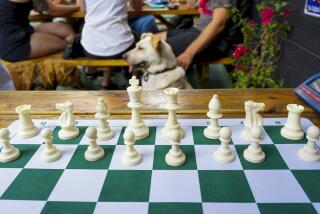Man Keeps Opponents in Check
- Share via
--Joel Benjamin is a man with all the right moves. The youngest U.S. chess grandmaster celebrated his 23rd birthday by defeating 28 simultaneous opponents, including a computer, and holding three others to draws. But the exhibition in Forest Park, Ill., was just a warm-up for the National Open in Las Vegas, where Benjamin will be competing for a first prize of up to $4,000 beginning Friday. Benjamin began playing chess when he was 8 and competed in his first tournament at 10. He won his grandmaster rating last year, one of only about 20 Americans who have attained that level. At the exhibition, it took a mere 12 moves to checkmate his first opponent. His youngest challenger, Marc Wilson, 10, hung on for 25 moves before being checkmated. And the computer, operating on a complex German-designed chess program, lasted only 37 moves. While some grandmasters use the same opening at each board in multiple play, Benjamin used a wide variety of openings during the 4 1/2-hour exhibition. “It reduces the boredom factor,” he explained.
--The tombstone of poor Laura Foster, whose name is nearly as obscure as her murderer is notorious, is back where it belongs. The 100-pound tombstone, which had been stolen from her grave in Lenoir, N.C., last summer, was found dumped by a roadside over the weekend. Laura was 22 in 1866 when she was stabbed to death by a 23-year-old Civil War veteran named Tom Dula, who, legend has it, got her pregnant and then conspired with his married lover, Ann Melton, to kill her. He was hanged for his crime. Tales of his dark deed circulated through the Southern hills for a hundred years. In 1966, the Kingston Trio came upon the ballad of Tom Dula, changed the name to Tom Dooley and sang:
Hang down your head, Tom Dooley,
Hang down your head and cry ,
You killed poor Laura Foster,
and now you’re bound to die.
--In Dallas, every dog has his day--in court. Four-legged scofflaws, including cats (and the occasional two-legged rooster), can make their case every Tuesday before Municipal Judge Max Fuentes. The pet court, known also as “doggie docket,” is a forum for airing neighborhood disputes and for animal owners contesting citations for such offenses as letting their animals run loose or failing to get rabies vaccinations. Pet owners can bring the accused into the courtroom to defend themselves. Their accusers often come armed with evidence such as recordings of dogs barking, Fuentes said. He said he tries to temper justice with mercy, but even so, court sessions can get animated.
More to Read
Go beyond the scoreboard
Get the latest on L.A.'s teams in the daily Sports Report newsletter.
You may occasionally receive promotional content from the Los Angeles Times.










